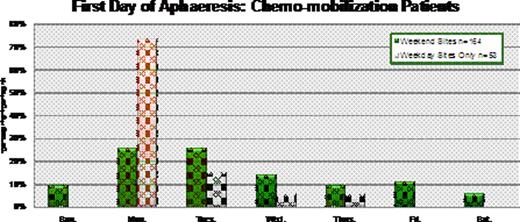Abstract
Abstract 1925
After mobilization, the timing of aphaeresis can be highly variable, often depending on rise in peripheral blood stem cell levels. Some centers that conduct autologous stem cell transplant (ASCT) do not conduct aphaeresis for stem cell collection on weekends. We examined stem cell collection practices and related outcomes in centers that do and do not conduct weekend aphaeresis.
A retrospective, multi-center chart review was conducted of multiple myeloma (MM) and lymphoma patients mobilized between January 1, 2006 and December 31, 2007 for ASCT. Patients were excluded if they were mobilized with plerixafor (Mozobil®) or were enrolled in a clinical trial of mobilization regimens. Data collected included demographics, disease and treatment history, mobilization regimen, blood counts, aphaeresis, remobilization, cells transplanted, time to engraftment, and resource use. Stem cell collection practices and related clinical outcomes were analyzed separately for sites that did and did not conduct weekend aphaeresis.
Data were collected for 292 consecutive patients in the different centers (91 patients from 4 sites that performed weekday only aphaeresis and 201 patients from 7 sites who performed aphaeresis on weekends and weekdays). Weekday only aphaeresis sites were more likely to conduct GCSF alone mobilization compared to weekend sites (42% vs. 21%, p<0.005). Approximately half the patients at each site had MM. The day of the week that aphaeresis was initiated differed dramatically between groups with 74% of chemo-mobilization patients starting aphaeresis on a Monday in the weekday only group compared to 26% in the other group. Approximately 15% of chemo-mobilization patients started aphaeresis on a weekend in the group that conducted weekend aphaeresis. No chemo-mobilization patients began aphaeresis on a Friday in the weekday only aphaeresis group compared to 11% in the other group. Sixteen of all aphaeresis procedures occurred on the weekend on the sites that conducted weekend aphaeresis. Significant differences were found between weekend and weekday only sites, with regards to total cells collected (16.01 × 106/kg vs. 9.2 × 106/kg, p<0.05) and cells collected on day one of aphaeresis (10.8 × 106/kg vs 5.5 × 106/kg, p<0.05) for chemo-mobilization patients. Use of peripheral blood stem cell counts differed markedly, with counts conducted on the first day of aphaeresis in 18% of weekday only group patients and 61% of weekend group patients.
Summary Table of Results
| Outcome . | Weekend Sites . | Weekday Sites . | P-value . | ||||
|---|---|---|---|---|---|---|---|
| n . | Mean . | SD . | n . | Mean . | SD . | ||
| Cells Collected 1st Day Aphaeresis | 163 | 10.8 | 14.0 | 52 | 6.7 | 7.4 | 0.0437 |
| Total Cells Collected | 164 | 16.8 | 21.5 | 53 | 9.2 | 7.2 | 0.0151 |
| Total Cells Transplanted | 162 | 9.2 | 10.3 | 50 | 7.0 | 4.5 | 0.1404 |
| Number of Aphaeresis Sessions | 164 | 2.0 | 1.0 | 53 | 2.3 | 1.8 | 0.0988 |
| Number of Mobilizations | 165 | 1.0 | 0.2 | 53 | 1.3 | 0.7 | <0.0001 |
| Outcome . | Weekend Sites . | Weekday Sites . | P-value . | ||||
|---|---|---|---|---|---|---|---|
| n . | Mean . | SD . | n . | Mean . | SD . | ||
| Cells Collected 1st Day Aphaeresis | 163 | 10.8 | 14.0 | 52 | 6.7 | 7.4 | 0.0437 |
| Total Cells Collected | 164 | 16.8 | 21.5 | 53 | 9.2 | 7.2 | 0.0151 |
| Total Cells Transplanted | 162 | 9.2 | 10.3 | 50 | 7.0 | 4.5 | 0.1404 |
| Number of Aphaeresis Sessions | 164 | 2.0 | 1.0 | 53 | 2.3 | 1.8 | 0.0988 |
| Number of Mobilizations | 165 | 1.0 | 0.2 | 53 | 1.3 | 0.7 | <0.0001 |
Significant differences in the management of patients were observed between sites that conduct and don't conduct weekend aphaeresis. Weekday only aphaeresis sites used a more regimented collection schedule with most collections starting on a Monday, potentially missing the “peak” day of cell collection. Sites that conducted weekend aphaeresis used a more cell-count based approach and were more likely to monitor peripheral blood stem cell counts. Collection success appears to be superior with the cell-count based approach that includes greater use of chemo-mobilization, cell count monitoring and weekend collection.
Chao:Genzyme: Research Funding. Bernard:Cornerstone Research: Employment, Equity Ownership. Fung:Genzyme: Consultancy, Honoraria, Speakers Bureau. Grima:Cornerstone Research Group Inc.: Employment, Equity Ownership. Holmberg:Genzyme: Membership on an entity's Board of Directors or advisory committees, Research Funding; Millenium: Research Funding; Otsuka: Research Funding; Seattle Genetics: Membership on an entity's Board of Directors or advisory committees, Research Funding; Merck: Research Funding; Celgene: Research Funding. Brown:Cornerstone Research: Employment. Horwitz:Genzyme: Honoraria, Research Funding. Shaughnessy:Genzyme: Consultancy, Honoraria, Research Funding, Speakers Bureau; Millenium: Honoraria, Speakers Bureau; Otsuka: Honoraria, Speakers Bureau. Tricot:Otsuka: I have an ongoing clinical study supported by Otsuka.
Author notes
Asterisk with author names denotes non-ASH members.


This feature is available to Subscribers Only
Sign In or Create an Account Close Modal